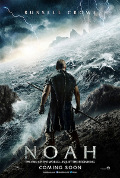
Directed by
Darren Aronofsky
138 minutes
Rated M
Reviewed by
Bernard Hemingway

Noah
Synopsis: The story of how Noah (Russell Crowe) built an ark and saved the world from Man’s rottenness.
Darren Aronofsky is responsible for some of the finest psychological studies of characters in extremis in contemporary American film. Requiem For A Dream (2000), The Wrestler (2008) and Black Swan (2010) are searing portraits of modern alienation. So he’s not a director one would expect to find helming a hoary old Biblical yarn. But then there’s his remarkable head trip, The Fountain (2006), which has its roots in the Book of Genesis where we also find the story of Noah and the Ark. So perhaps it’s not such an incongruity after all. Indeed, with Noah we see Aronofsky bending the apocalyptic blockbuster to the kind of metaphysical fancies and emotional stresses that have characterized his film-making for the past 15 years. Or at least he tries to. Unfortunately, the source material and the conventions of the blockbuster style overwhelm him. But it is an honorable defeat and one that is a good deal more rewarding viewing than most of its peers.
As with so many Hollywood adaptations, the original text is merely a springboard for Aronofsky and co-writer Ari Handel to transform it into an epic story of retribution and redemption. The Biblical version which at best amounts to a plot synopsis, is enhanced with a number of elements: an internecine conflict between the descendants of Seth, of whom Noah and his family appear to the sole surviving representatives, and the descendants of Cain, a corrupt and violent race headed up by Tubal-Cain (Ray Winstone); an orphan girl (Emma Watson) who marries Noah’s son, Shem (Douglas Booth); and, more than a little oddly but you will eventually see why, The Watchers, fallen angels trans-substantiated into huge articulated assemblages of rocks that befriend Noah and his family.
Looking like a cross between Transformers and Mad Max Beyond The Thunderdome as re-imagined by Peter Jackson, on one level Noah offers a familiar portfolio of CGI-nurtured blockbuster tropes: everything from aforesaid ante-diluvian Transformers with very deep voices (thanks to Nick Nolte and Frank Langella) pounding their way across barren wastelands and doing battle with hordes of faceless assailants, to wise old men with long stringy hair (well ,only one actually, Methuselah, played by Anthony Hopkins) while multitudinous beasts of the earth and the air swarm their way to Noah’s 300x50x30 cubit (authentic Biblical specs) ark.
This type of thing is familiar fare but infusing it with substance is a grand vision of Divine retribution in the face of human ingratitude as God despairs of the folly of Man who has despoiled his creation and his agent, Noah, becomes obsessed with his righteous mission. This is where Aronofsky puts his stamp upon the generic blockbuster form, investing with allegorical purpose what in the hands of a less interesting director would have been just more visual spectacle. Aronofsky is not afraid to break the surface narrative, in the film’s most visually inventive scene, inserting a time-lapse story of the Creation and Fall which takes us up to modern times. One can’t help but imagine that Terrence Malick would have loved to have thought of such a neat device for his Tree Of Life.
Also critical to the film’s success is Crowe’s intensely physical Noah, well-matched by Winstone’s Tubal-Cain, the two men embodying and expressing the film’s elemental moral polarities. Crowe commands the screen with a suitably formidable presence while Winstone seethes with malignancy. Less effective are the support roles. Jennifer Connelly, the quality of her performances aside, is groomed like a Manhattan gym junkie in handstitched designer burlap threads and looks more like a bo-ho fashion plate than the spouse of an Old Testament patriarch. Indeed all the supports including Booth and Watson as well as Logan Lerman and Leo McHugh Carroll, as Noah’s sons, Ham and Japeth, are far too pretty to fit with the otherwise sombrely grungy tones of the production.
Ultimately however it is the source material which defeats Aronofsky, who like some Christian fundamentalist misrepresents time-shrouded myth as (cinematically) real events. Whereas in The Fountain he seamlessly integrated the imaginary and the real here he simply juxtaposes them. Noah is essentially an action hero motivated by dreams and hallucinations, hardly something new for the genre. But to explain how he could have built a vessel half the size of the Titanic in the middle of a desert, how every species of animal in existence could have gotten aboard it, let alone coexisted for nine months (imagine the stench! ) and, probably most grievously, how a single nuclear family plus one could possibly re-generate the human race requires a suspension of disbelief that even Hollywood should know better than to ask of us. This sort of guff may have passed scrutiny in Old Testament days when the known world extended the length of a camel ride or even in the 1950s sword-and-sandals heydays when the word of God was enough but it seems all too silly for words today.
Aronosky is not a film-maker who needs scale to shock and awe. Indeed his qualities that do, his intelligence and imagination, are too fine to be well served by the crude articulations of the blockbuster. That he has managed as much as he has with them is still quite an achievement.

Want more about this film?


Want something different?




